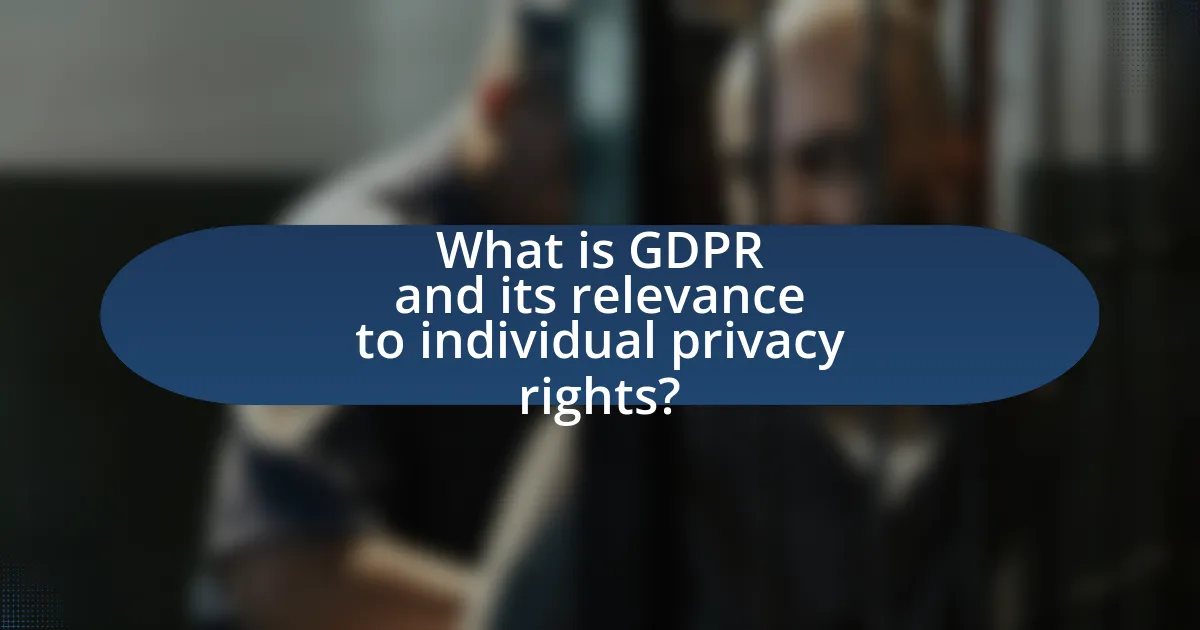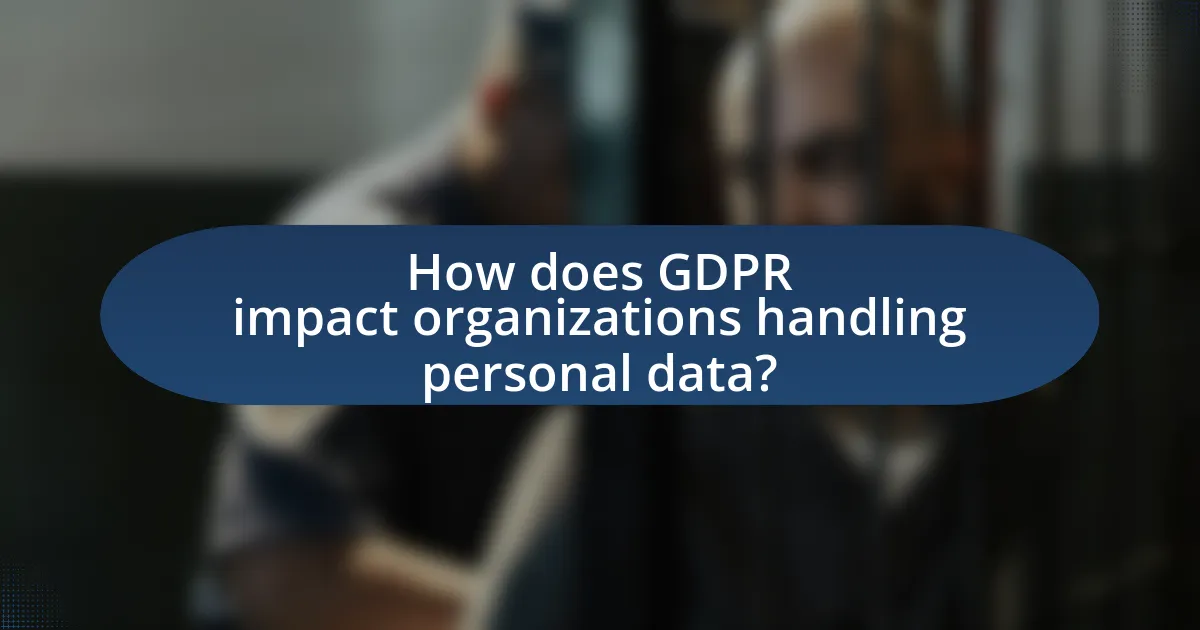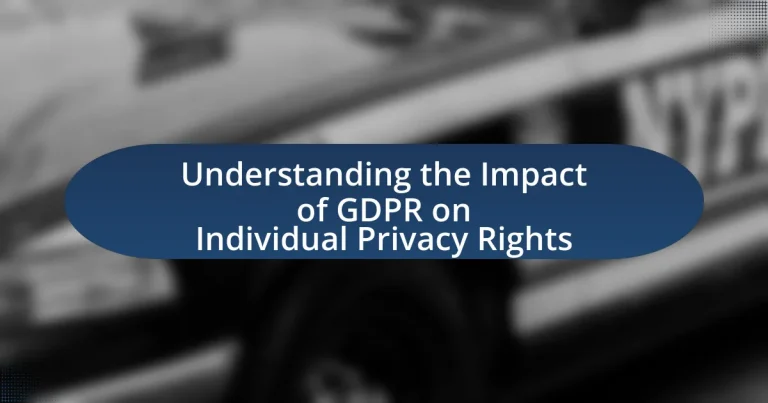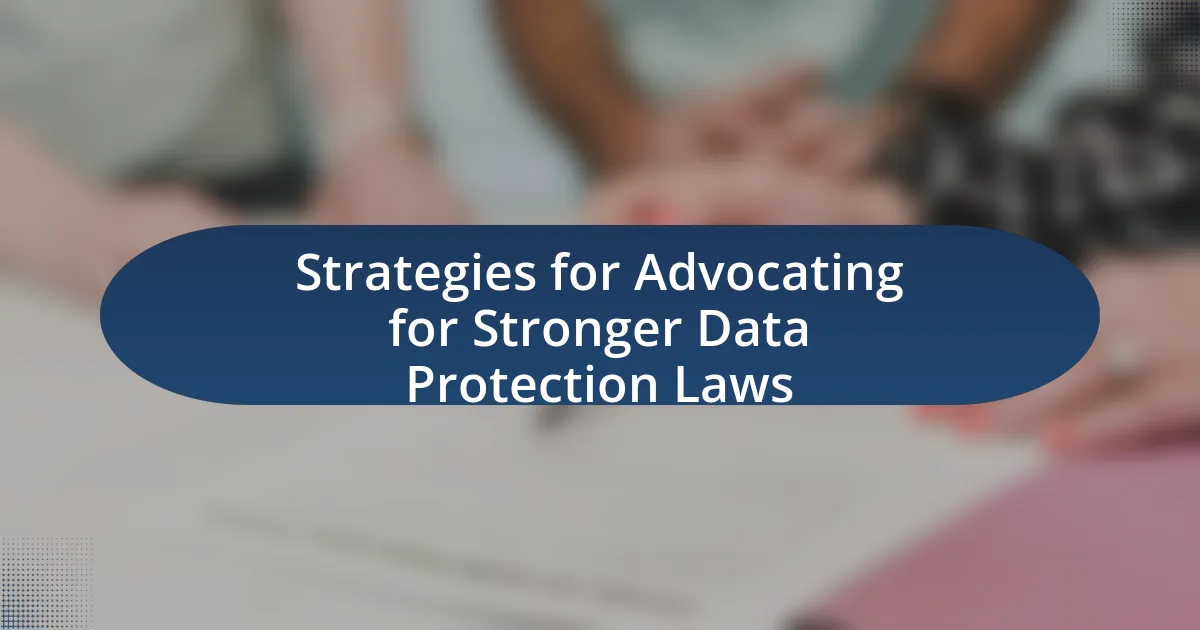The General Data Protection Regulation (GDPR) is a significant data protection law enacted by the European Union in May 2018, aimed at enhancing individual privacy rights. It establishes comprehensive guidelines for the collection, storage, and processing of personal data, granting individuals rights such as access, rectification, erasure, and data portability. The regulation defines personal data broadly and outlines key principles that organizations must follow to ensure lawful and transparent data handling. Additionally, it imposes strict obligations on organizations to protect personal data and outlines the consequences for non-compliance, while also addressing the challenges individuals face in exercising their rights under GDPR.

What is GDPR and its relevance to individual privacy rights?
GDPR, or the General Data Protection Regulation, is a comprehensive data protection law enacted by the European Union in May 2018 that enhances individual privacy rights. It establishes strict guidelines for the collection, storage, and processing of personal data, granting individuals greater control over their personal information. Under GDPR, individuals have rights such as the right to access their data, the right to rectify inaccuracies, the right to erasure, and the right to data portability. These rights are designed to empower individuals and ensure that their personal data is handled transparently and securely, reflecting a significant shift towards prioritizing individual privacy in the digital age.
How does GDPR define personal data?
GDPR defines personal data as any information relating to an identified or identifiable natural person. This includes data such as names, identification numbers, location data, and online identifiers. The regulation emphasizes that an identifiable person is one who can be identified, directly or indirectly, particularly by reference to an identifier. This definition is crucial as it establishes the scope of data protection rights under GDPR, ensuring that a wide range of information that can be linked to individuals is covered.
What types of information are considered personal data under GDPR?
Personal data under GDPR includes any information that relates to an identified or identifiable natural person. This encompasses a wide range of data types, such as names, identification numbers, location data, online identifiers, and specific characteristics or attributes that can identify an individual. The GDPR defines personal data broadly to ensure comprehensive protection of individual privacy rights, reflecting the importance of safeguarding various forms of information that can be linked to a person.
How does the definition of personal data impact individual privacy rights?
The definition of personal data directly impacts individual privacy rights by determining what information is protected under privacy laws. Under the General Data Protection Regulation (GDPR), personal data is defined as any information relating to an identified or identifiable natural person, which includes names, identification numbers, location data, and online identifiers. This broad definition ensures that a wide range of personal information is subject to privacy protections, thereby enhancing individuals’ rights to control their data. For instance, GDPR grants individuals rights such as access, rectification, and erasure of their personal data, reinforcing their ability to manage their privacy effectively. The European Data Protection Board reported that these rights empower individuals to take control of their personal information, thereby strengthening their privacy in the digital age.
What are the key principles of GDPR that protect individual privacy?
The key principles of GDPR that protect individual privacy are lawfulness, fairness, and transparency; purpose limitation; data minimization; accuracy; storage limitation; integrity and confidentiality; and accountability. Lawfulness, fairness, and transparency require that personal data is processed legally and transparently, ensuring individuals are informed about how their data is used. Purpose limitation mandates that data is collected for specified, legitimate purposes and not further processed in a manner incompatible with those purposes. Data minimization emphasizes that only the necessary data for the intended purpose should be collected. Accuracy ensures that personal data is kept up to date and corrected when necessary. Storage limitation requires that personal data is retained only for as long as necessary for the purposes for which it was processed. Integrity and confidentiality mandate that personal data is processed securely to protect against unauthorized access or loss. Finally, accountability places the responsibility on organizations to demonstrate compliance with these principles. These principles collectively enhance individual privacy rights by establishing clear guidelines for data handling and processing.
How does the principle of data minimization enhance privacy rights?
The principle of data minimization enhances privacy rights by ensuring that organizations only collect and process personal data that is necessary for a specific purpose. This limitation reduces the risk of unauthorized access and misuse of personal information, thereby protecting individuals’ privacy. For instance, under the General Data Protection Regulation (GDPR), organizations are required to justify the necessity of data collection, which directly supports individuals’ rights to control their personal information. By minimizing data collection, the likelihood of data breaches and the potential for harm to individuals is significantly decreased, reinforcing the overall framework of privacy rights established by GDPR.
What role does consent play in GDPR’s protection of individual privacy?
Consent is a fundamental element in GDPR’s protection of individual privacy, as it establishes the legal basis for processing personal data. Under GDPR, organizations must obtain explicit consent from individuals before collecting or using their personal information, ensuring that individuals have control over their data. This requirement is reinforced by Article 7 of the GDPR, which stipulates that consent must be freely given, specific, informed, and unambiguous. Consequently, this framework empowers individuals to make informed decisions regarding their personal data, thereby enhancing their privacy rights and fostering trust in data handling practices.
What rights do individuals have under GDPR regarding their personal data?
Individuals have several rights under the General Data Protection Regulation (GDPR) regarding their personal data. These rights include the right to access their personal data, the right to rectification, the right to erasure (also known as the right to be forgotten), the right to restrict processing, the right to data portability, and the right to object to processing.
The right to access allows individuals to obtain confirmation of whether their personal data is being processed and to access that data. The right to rectification enables individuals to request correction of inaccurate personal data. The right to erasure permits individuals to request deletion of their personal data under certain conditions. The right to restrict processing allows individuals to limit how their data is used. The right to data portability gives individuals the ability to obtain and reuse their personal data across different services. Lastly, the right to object allows individuals to challenge the processing of their personal data in certain situations.
These rights are established in Articles 15 to 22 of the GDPR, which came into effect on May 25, 2018, reinforcing the protection of personal data and enhancing individuals’ control over their information.
What is the right to access personal data?
The right to access personal data allows individuals to obtain confirmation from organizations about whether their personal data is being processed and to access that data. This right is enshrined in the General Data Protection Regulation (GDPR), which mandates that individuals can request information about the nature of their data, the purposes of processing, and the recipients of the data. Under Article 15 of the GDPR, individuals have the right to receive a copy of their personal data in a structured, commonly used, and machine-readable format, reinforcing transparency and control over personal information.
How does the right to erasure (the right to be forgotten) function?
The right to erasure, also known as the right to be forgotten, allows individuals to request the deletion of their personal data from an organization’s records under specific circumstances. This right functions primarily under the General Data Protection Regulation (GDPR), which stipulates that individuals can invoke this right when their data is no longer necessary for the purposes for which it was collected, when they withdraw consent, or when they believe their data has been unlawfully processed. The GDPR mandates that organizations must respond to such requests without undue delay and within one month, ensuring compliance with the regulation.

How does GDPR impact organizations handling personal data?
GDPR significantly impacts organizations handling personal data by imposing strict regulations on data collection, processing, and storage. Organizations must obtain explicit consent from individuals before processing their personal data, ensuring transparency about how data will be used. Additionally, GDPR mandates that organizations implement robust security measures to protect personal data and report data breaches within 72 hours. Non-compliance can result in substantial fines, up to 4% of annual global turnover or €20 million, whichever is higher, as established by the regulation. This framework not only enhances individual privacy rights but also compels organizations to adopt more responsible data management practices.
What obligations do organizations have under GDPR to protect individual privacy?
Organizations have specific obligations under the General Data Protection Regulation (GDPR) to protect individual privacy, including ensuring lawful processing of personal data, implementing data protection by design and by default, and maintaining transparency with data subjects. The GDPR mandates that organizations must obtain explicit consent from individuals before processing their personal data, ensuring that individuals are informed about how their data will be used. Additionally, organizations are required to implement appropriate technical and organizational measures to safeguard personal data against unauthorized access, loss, or damage. The regulation also obligates organizations to report data breaches to the relevant authorities within 72 hours and to notify affected individuals when there is a high risk to their rights and freedoms. These obligations are enforced by supervisory authorities, which have the power to impose significant fines for non-compliance, reinforcing the importance of protecting individual privacy under GDPR.
How must organizations ensure transparency in data processing?
Organizations must ensure transparency in data processing by clearly informing individuals about how their data is collected, used, and shared. This includes providing accessible privacy notices that detail the purpose of data processing, the legal basis for processing, and the rights of individuals under regulations such as the General Data Protection Regulation (GDPR). According to GDPR Article 12, organizations are required to communicate information in a concise, transparent, intelligible, and easily accessible form, using clear and plain language. This legal framework mandates that organizations not only disclose their data practices but also facilitate individuals’ understanding of their rights, thereby reinforcing accountability and trust in data handling practices.
What measures must organizations implement to secure personal data?
Organizations must implement robust data protection measures to secure personal data, including encryption, access controls, regular security audits, and employee training. Encryption protects data by converting it into a secure format that can only be read by authorized users, thereby mitigating risks of unauthorized access. Access controls ensure that only individuals with the necessary permissions can access sensitive information, reducing the likelihood of data breaches. Regular security audits help identify vulnerabilities in systems and processes, allowing organizations to address potential weaknesses proactively. Employee training raises awareness about data protection practices and the importance of safeguarding personal information, which is crucial for compliance with regulations like the GDPR. These measures collectively enhance the security of personal data and align with the principles outlined in the GDPR, which emphasizes the need for organizations to take appropriate technical and organizational measures to protect personal data.
What are the consequences for organizations that violate GDPR?
Organizations that violate GDPR can face significant financial penalties, with fines reaching up to €20 million or 4% of their global annual revenue, whichever is higher. This regulatory framework is enforced by data protection authorities across EU member states, which have the authority to investigate complaints and impose sanctions. For instance, in 2021, Amazon was fined €746 million by Luxembourg’s National Commission for Data Protection for GDPR violations, highlighting the serious financial repercussions. Additionally, organizations may suffer reputational damage, loss of customer trust, and potential legal actions from affected individuals, further compounding the negative impact of non-compliance.
What types of penalties can organizations face for non-compliance?
Organizations can face significant penalties for non-compliance with GDPR, including fines up to €20 million or 4% of annual global turnover, whichever is higher. These financial penalties are enforced by data protection authorities and can vary based on the severity of the violation, such as failure to obtain consent, inadequate data protection measures, or not reporting data breaches in a timely manner. For instance, in 2021, Amazon was fined €746 million for GDPR violations, illustrating the substantial financial risks associated with non-compliance.
How do breaches of GDPR affect individual privacy rights?
Breaches of GDPR significantly undermine individual privacy rights by exposing personal data to unauthorized access and misuse. When organizations fail to comply with GDPR regulations, they risk compromising the confidentiality, integrity, and availability of personal information, which can lead to identity theft, financial loss, and emotional distress for affected individuals. For instance, the Information Commissioner’s Office reported that in 2020, over 40% of data breaches involved personal data, highlighting the direct impact on individuals’ privacy rights. Such breaches not only violate the legal protections established by GDPR but also erode public trust in data handling practices, further diminishing individuals’ confidence in their privacy rights.

What challenges do individuals face in exercising their GDPR rights?
Individuals face several challenges in exercising their GDPR rights, primarily due to complexity, lack of awareness, and administrative hurdles. The complexity of GDPR regulations can make it difficult for individuals to fully understand their rights, such as the right to access, rectify, or erase personal data. A lack of awareness about these rights often leads to underutilization; a survey by the European Commission in 2020 indicated that only 29% of EU citizens were aware of their rights under GDPR. Additionally, administrative hurdles, such as lengthy response times from organizations and unclear processes for submitting requests, can deter individuals from exercising their rights effectively. These challenges collectively hinder the ability of individuals to fully benefit from the protections intended by GDPR.
How can individuals effectively assert their rights under GDPR?
Individuals can effectively assert their rights under GDPR by directly contacting the data controller or processor to exercise their rights, such as the right to access, rectify, or erase personal data. This process involves submitting a clear request that specifies the right being asserted and providing necessary identification to verify their identity. According to GDPR Article 12, data controllers must respond to requests without undue delay and within one month, ensuring individuals are informed of their rights and the actions taken. This legal framework empowers individuals to take control of their personal data and seek remedies if their rights are violated.
What steps should individuals take to request access to their personal data?
Individuals should follow a structured process to request access to their personal data. First, they need to identify the organization that holds their data and locate its contact information, typically found on the organization’s website. Next, individuals should submit a formal request, often referred to as a Subject Access Request (SAR), which can be done via email or a designated online form. This request should clearly state the individual’s identity, specify the data being requested, and include any necessary identification to verify their identity.
According to the General Data Protection Regulation (GDPR), organizations are required to respond to such requests within one month, providing the requested data or explaining any reasons for refusal. This legal framework ensures that individuals have the right to access their personal information held by organizations, reinforcing their privacy rights.
How can individuals ensure their right to erasure is respected?
Individuals can ensure their right to erasure is respected by formally requesting data deletion from organizations that hold their personal information. Under the General Data Protection Regulation (GDPR), individuals have the right to request the erasure of their data when it is no longer necessary for the purposes for which it was collected, or if they withdraw consent on which the processing is based. To effectively exercise this right, individuals should submit a clear and concise request to the data controller, specifying the data they wish to be erased and citing the relevant provisions of the GDPR. Organizations are legally obligated to respond to such requests within one month, as stipulated in Article 12 of the GDPR, which reinforces the individual’s right to control their personal data.
What barriers exist that may hinder individuals from fully exercising their rights?
Barriers that hinder individuals from fully exercising their rights under GDPR include lack of awareness, complex legal language, and inadequate resources for enforcement. Many individuals are unaware of their rights, such as the right to access personal data or the right to erasure, which limits their ability to exercise these rights effectively. The complexity of legal terminology in GDPR can create confusion, making it difficult for individuals to understand their entitlements. Additionally, limited resources for legal support and enforcement mechanisms can prevent individuals from pursuing their rights, as they may lack the means to challenge violations or seek redress. These factors collectively contribute to the underutilization of privacy rights established by GDPR.
How does lack of awareness about GDPR affect individual privacy rights?
Lack of awareness about GDPR significantly undermines individual privacy rights by preventing individuals from exercising their rights to data protection. When individuals are unaware of GDPR provisions, such as the right to access, rectify, or erase personal data, they cannot effectively assert these rights against organizations that process their information. Research indicates that a significant portion of the population lacks knowledge about their data protection rights under GDPR, which can lead to unauthorized data processing and exploitation. For instance, a survey by the European Commission in 2021 revealed that only 29% of EU citizens felt informed about their rights under GDPR, highlighting a critical gap in awareness that directly impacts their ability to safeguard personal information.
What role does technology play in complicating the exercise of GDPR rights?
Technology complicates the exercise of GDPR rights by creating challenges in data access, portability, and deletion. The complexity of modern data ecosystems, including cloud storage and interconnected devices, makes it difficult for individuals to identify where their personal data is stored and how to access it. For instance, a study by the European Data Protection Board highlights that the sheer volume of data processed by organizations can hinder individuals’ ability to exercise their rights effectively. Additionally, automated systems may not always provide clear options for data deletion or modification, further complicating compliance with GDPR requirements.
What best practices can individuals adopt to protect their privacy rights under GDPR?
Individuals can adopt several best practices to protect their privacy rights under GDPR, including being aware of their rights, managing consent, and utilizing data access tools. Awareness of rights such as the right to access, rectify, and erase personal data empowers individuals to take control of their information. Managing consent involves actively reviewing and adjusting privacy settings on platforms to ensure that personal data is only shared when explicitly permitted. Utilizing data access tools, such as requesting data portability from service providers, allows individuals to understand and control how their data is used. These practices align with GDPR’s emphasis on transparency and individual control over personal data, reinforcing the importance of informed consent and data protection.
How can individuals stay informed about their rights and GDPR updates?
Individuals can stay informed about their rights and GDPR updates by regularly visiting official websites such as the European Commission’s GDPR page and national data protection authorities. These sources provide accurate and up-to-date information regarding individual rights under GDPR, including the right to access, rectify, and erase personal data. Additionally, subscribing to newsletters from privacy advocacy organizations, attending webinars, and following relevant social media channels can enhance awareness of changes and interpretations of GDPR. These methods ensure individuals receive timely updates and comprehensive insights into their privacy rights and the evolving landscape of data protection regulations.
What proactive measures can individuals take to safeguard their personal data?
Individuals can safeguard their personal data by implementing strong passwords, enabling two-factor authentication, and regularly updating software. Strong passwords, which include a mix of letters, numbers, and symbols, significantly reduce the risk of unauthorized access; studies show that 81% of data breaches are linked to weak passwords. Two-factor authentication adds an additional layer of security, making it harder for attackers to gain access even if they have the password. Regularly updating software ensures that individuals benefit from the latest security patches, as outdated software is a common target for cybercriminals. These proactive measures collectively enhance personal data protection and align with the principles of GDPR, which emphasizes the importance of data security.





